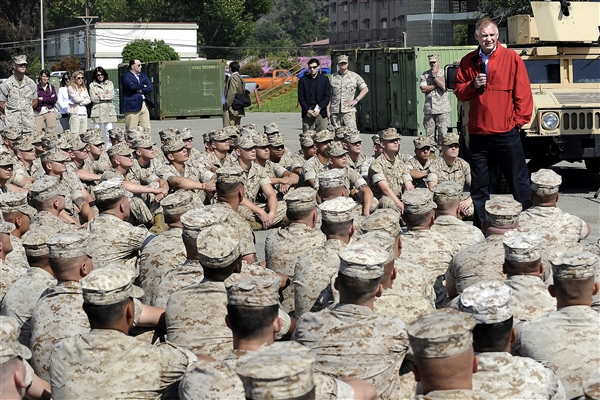A former refugee who fled the Taliban regime in Afghanistan has returned to the country with the UK’s Stabilisation Unit to work as a Cultural Affairs Advisor in the Provincial Reconstruction Team in Helmand.
 |
| Pamir Patang (right) with Governor Gulab Mangal on a recent visit to the Stabilisation Unit in London Source: Ministry of Defence, UK Click to enlarge |
Pamir Patang fled Taliban-controlled Afghanistan in 2000. He has since become a deployable civilian expert for the UK Government’s Stabilisation Unit, owned jointly by the Department for International Development (DFID), the Foreign & Commonwealth Office (FCO) and the MOD.
A 37-year-old Pashtun from Kabul who is now a British national and lives with his family in west London, Pamir is fluent in Pashtu, Dari, English and Russian; linguistic skills that are vital to the Stabilisation Unit’s work in Helmand.
Utilising these skills Pamir was deployed in October 2009 by the Stabilisation Unit to work as a Cultural Affairs Advisor in the Provincial Reconstruction Team (PRT) in Helmand where he helps deliver cultural and political advice to Governor Gulab Mangal, Helmand’s provincial governor.
His remit since then has broadened to include much more political liaison, and today he is the Senior Afghanistan Country Advisor:
“I’m the interlocutor between the senior PRT leadership and the Afghan Government, especially the regional governor Gulab Mangal, whom I advise on British security policy and political affairs,” Pamir explained.
“I travel a lot with him and recently have been out to the districts, to Nad ‘Ali, Musa Qal’ah, Babaji, Now Zad and Marjah. I’m also the cultural and political advisor to the PRT.”
In recent months, much of Pamir’s work has focused on the Mullah Engagement Programme, intended to counter Taliban propaganda and educate the Afghan religious community about Britain’s true intentions and activities in Afghanistan.
Together with the PRT’s political section, Pamir was the architect of this programme, getting the wider PRT to engage with the local religious community and liaise with the religious community in the UK.
As part of this strategy Pamir accompanied a delegation of Afghan mullahs on their visit to the UK earlier this year:
“It was a great success,” Pamir recalled. “The first person they met in the UK was a British immigration officer of Pakistani background. They were surprised and happy to see him, especially when he greeted them with ‘Salaam aleikum’, the traditional Muslim greeting meaning ‘peace be with you’.”
Further meetings followed with British Muslim scholars and officials from the FCO, DFID and the MOD. In a meeting with General Sir David Richards, the former Chief of the General Staff, the Afghan mullahs met senior Muslim officers:
“The Taliban tell everyone that Britain is an infidel nation hostile to Muslims, but the mullahs were able to see for themselves that in fact Britain is a tolerant country in which Muslims can build mosques and practise their religion peacefully,” Pamir said.
“They’ll go back to their villages, preach in the mosques and spread the word based on what they have seen. Winning hearts and minds is the most effective campaign in Afghanistan.”
Pamir says the PRT has made great strides during his time in Lashkar Gah. The number of civilian staff has doubled, security has improved dramatically, the key Taliban stronghold of Marjah was liberated from the Taliban during Operation MOSHTARAK and new programmes have been rolled out across the province helping Afghans return to normal lives.
Pamir sees his work as benefiting both Afghanistan and his adopted country of Britain:
“I am very proud to be a member of British society. I have achieved a lot within ten years and have become a consultant to the British Government,” he said.
“As a member of the Stabilisation Unit, I am helping support the Afghan Government work for a stable and prosperous Afghanistan and, whilst helping Afghanistan, we are also making the UK more secure.”
Press release
Ministry of Defence, UK

 von
von 